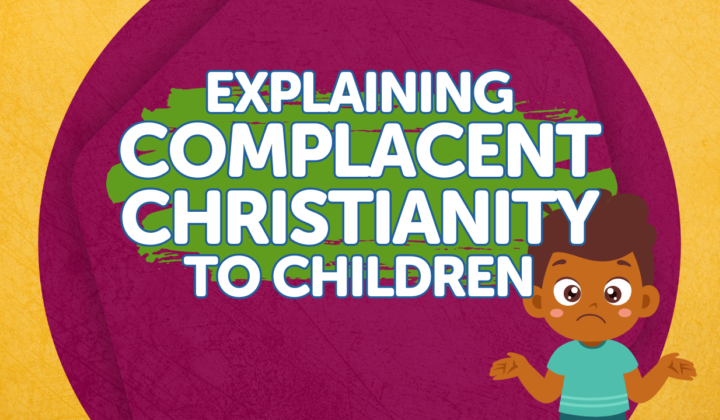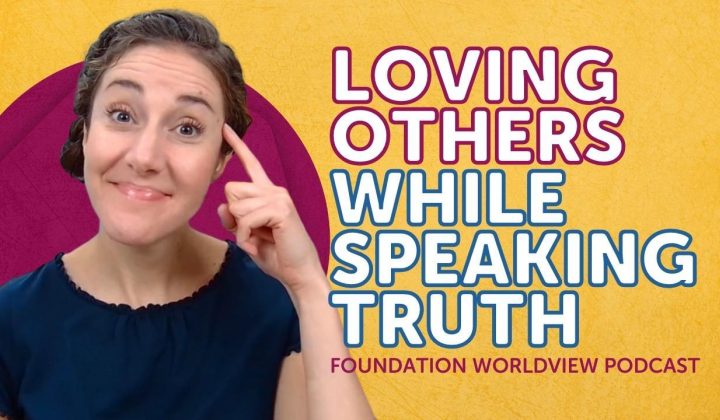Learn more about the journey that led to us equipping kids to carefully evaluate every idea they encounter.
Meet members of our team who have contributed to curriculum development.
Hear from real users of the Foundation Curriculum.
Learn what we believe about God, Jesus, Scripture, and more.
Talking to Kids About Christians Who Don’t Follow the Bible
How do we explain when someone claims to be a Christian but doesn't follow biblical teachings, especially in a personal case? In this episode, we’ll explore how to guide children with discernment and love in these tricky situations, using practical strategies to help them understand faith and behavior while fostering kindness and understanding.
Transcript
Note: The following is an auto-transcript of the podcast recording.
Hello, friends. Today's podcast question says, "how do I, age appropriately ,explain to my young children how someone can claim to be a Christian but not follow what the Bible says. In my specific case, my own Jesus professing sister has entered a same-sex relationship." Really important question for us to think through because we know that so many people today who claim the name of Christ are also living lifestyles that directly contradict the teachings of Jesus and what is revealed as truth in Scripture. And that's the question that we're going to look at today on the Foundation Worldview Podcast where we seek to answer your questions so that you can equip the children that God has placed in your care to carefully evaluate every idea they encounter and understand the truth of the biblical worldview. I'm your host, Elizabeth Urbanowicz, and I'm thrilled that you've joined me for this episode today.
Now, as we think through this question that the questioner has asked, we know that there are many situations like this that we are going to encounter in our lives and that our children are going to encounter. So as is typical with many Foundation Worldview podcasts, I am going to ask us a question to help us think through how to approach this particular question. And most of you can probably already guess what my question is going to be. And that question is going to be "what is the goal?" Anytime we're seeking to do something with our children, we want to think through what is the goal? Because if we don't have a clear picture of what the goal is, we're not going to be directly walking towards it. We're going to be meandering, we're going to be wasting time and thought and energy, and our children are probably going to end up confused. So if we think through what is the goal, we can make sure that everything we do is pointing us towards that goal.
So I would suggest that in this situation, the goal in this situation is to teach our children to be discerning and to love others. So we want to, again, teach our children to be discerning and to love others. Now, there's an activity that I think we can do with our kids that can help them think through how we know if someone is truly following Jesus. And actually this activity, it was not created by CS Lewis, but this activity is based off of an analogy that CS Lewis gives in his book Mere Christianity. And so I think this is an activity we can do with our children to help them think through this. So what we can do is we can take our children to different locations and ask them questions. So first we can, if we have a garage, we can take our children to the garage and we can say, okay, we're standing in the garage. Does standing in the garage make us a car? And then, no, that's so silly. And then talk about what is a car? Well, a car is a vehicle that's used to get people from one place to another. A car has four wheels, it has a driver's seat, it has a steering wheel, it has a gas pedal and a brake pedal, it has an engine. All of these things make up a car and then talk about, is that what we are? No, we might be standing in a garage, but standing in a garage doesn't make us a car. Then if you get a large delivery one day and you have a big box, after you've taken the package out of that box, then give your children an opportunity to actually crawl into the box and see if they can fit into it. And you can do that, have some fun, and then say, okay, you're sitting inside of a box right now. Does that make you an Amazon package? No, it doesn't. You're a human. You're not an object. So in order to be an Amazon package, you have to be an object. An object that was purchased on Amazon. Then if you're out at the lake one day or the ocean, you can stand in the shallow end and say, okay, we're standing in the water. Does this make us fish? Say no. Okay, what are fish? Fish are animals that they have single vertebrae, they have scales and they breathe in oxygen under the water. And so then say, okay, standing in the water doesn't make us a fish. Sitting in a box doesn't make us an Amazon package. Standing in a garage doesn't make us a car.
Well then when you are at your church building for a corporate worship service, you're saying, okay, we are at a church building. Does being inside this building make us a Christian? That's a really interesting question, and it's one that you might not be able to answer right away. So what I would recommend is after you ask that question, say, you know what? When we go home, we're going to look up some verses in the Bible that talk about being a Christian. And so once you're at home, I would recommend you go, there's many passages that you could go to, but one that I think is particularly pertinent to this situation is John chapter 14, verses 23 and 24. Those verses read. Jesus replied, "Anyone who loves me will obey my teaching. My father will love them, and we will come to them and make our home with them. Anyone who does not love me will not obey my teaching. These words you hear are not my own; yhey belong to the Father who sent me." So then we can ask, okay, so according to this passage, what is the evidence that someone actually loves Jesus and is following him? That's right. The evidence that someone loves Jesus and is following him is that that person is obeying Jesus's commands. And then we can talk with our kids and say, you know what? We will never be able to be certain on this side of heaven who is a Christian and who is not. However, if someone is publicly disobeying the commands of God and they're not repenting, that's some pretty strong evidence that that person is not a Christian, that they're not following Jesus. And then we can talk through Mommy's a Christian, daddy's a Christian. Do we still sin? Yeah, we do. We still sin against God every day. And what do we need to do when we sin against God? God, that's right. We need to repent and confess of that sin. And then you can give examples of when you sinned against them and you confessed and repented of that sin and then say, Christians are still going to sin, but when we do, we are going to confess of that sin and repent of that sin and receive Jesus's forgiveness. Say if somebody is, they're sinning against God and they're never repenting of that sin, it's possible it could be possible that that person could be a Christian, but it is not likely at all that that person is a Christian. So just for them to understand standing in a garage doesn't make you a car. That's where the CS Lewis analogy came in mere Christianity. He says, not something to the effect of just like standing in a garage doesn't make you a car, sitting in a church doesn't make you a Christian. So they understand standing in a garage doesn't make you a car. Sitting in a package, sitting in a box doesn't make you an Amazon package. Standing in the lake doesn't make you a fish. Sitting in a church doesn't make you a Christian. What is evidence that you're a Christian that you're following Jesus' commands?
And so then once we have this understanding, or once they have this understanding, we can say, we're going to encounter many people who claim to be Christians, but they don't follow Jesus' commands. And so then say, okay, we need to talk about what is your responsibility when you see someone who is not following Jesus' commands but says they're a Christian. Okay, now you can talk how as an adult it is your responsibility when you see someone who is a Christian who is not confessing and repenting of sin, but is just living in that sin. As adults, as Christians, it is our responsibility to love our brothers and sisters in Christ well. And to ask them about that, to say, Hey, this is what Scripture says, and this is what you're doing. I'm worried about you - to confront them. However, that's not your child's responsibility. That's not the responsibility of children. So then you need to walk through what their responsibility is.
So what I'm going to walk us through right now is how we address this concept in our God's Good Design curriculum at Foundation Worldview. That's a curriculum for children ages four plus, on God's good design for identity, gender, marriage, sexuality, and family. And so in one of our final lessons in that curriculum, the big truth we cover is we should love others even when they do not follow God's good design. And so what we teach in that lesson is we say, as a child, it's usually not your responsibility to go around telling other people that they are sinning. It might be your mom's responsibility or your dad's responsibility, but it's not your responsibility as a child. And so we give them three steps in that curriculum and we train them and we have them practice and practice and practice and play many games with this so that they really get these concepts solidified in their mind. But the three steps that we give them is, number one, recognize this is not God's good design. Number two, in your mind, remind yourself of the truth. And number three, be kind. So in that curriculum, we give them examples of they might be in the grocery store and they see a family that has two dads. So first they recognize that this is not God's good design. Second, in their minds, they remind themselves of the truth. So in that kind of situation, we train them to say, marriage is one man and one woman becoming one flesh for life.
And then be kind, treat that family as you would any other family. So for the questioner who wrote in this question about your sister entering into a same sex relationship, we can talk before we see that sister, we can say aunt, so-and-So she right now, she's rejecting and ignoring God's good design. And rather than believing that marriage is for one man and one woman becoming one flesh for life, she's thinking that it's okay for marriage to be two men or two women. And so then to say, okay, when we see aunt so-and-so with her friend at Christmas, what are we going to do? One, we're going to remind ourselves in our minds, this is not God's good design. Then in our mind, we're going to remind ourselves of the truth. We're going to say in our mind, God designed marriage to be one man and one woman becoming one flesh for life. And you can have your kids practice this, okay? Practice saying that in your mind so it doesn't come out of their mouths. And then say, then we're going to be kind. How are we going to be kind? We're going to give our aunt a hug. We're going to say, Merry Christmas. We're going to ask how she's doing. We're going to treat her just like we do all of our other aunts and uncles. So these are three steps that you can go through with your kids just to prepare them for the situations that they're going to face when they're interacting with family members or friends.
If you have not yet checked out our God's Good Design curriculum and you have children ages nine or younger, I highly, highly, highly, highly, highly recommend that you check out these materials. These are the materials that are going to set a foundation for life for your children to understand why it is that we can trust God and his word and his design to prepare them to embrace God's good design for them to reject the corruptions of that design and to love God well through loving others. So highly recommend you check out those materials specifically with just what we've talked about today in this podcast. We go over those steps that I mentioned repeatedly. We have games and activities to help solidify this. So this is really laying the foundation for our children to understand God's good design and to encounter these tricky situations that they're going to face in our culture.
Well, that's a wrap for today. If you have a question that you would like for me to answer on a future Foundation Worldview podcast, you can submit that by going to FoundationWorldview.com/podcast. Also ask that you would invest the few seconds it takes to write this comment, to write a review. And then as we leave, my prayer for you is the same as always, that no matter the situation in which you and the children God has placed in your care, find yourselves that you would trust that God is working all things together for your good by using all things to you more into the image of His Son. I'll see you next time.
Related Posts and insights

Non-Christian Playdates?
In this episode, we tackle a listener's question on play dates at non-Christian homes and concerns about worldly exposure. We discuss balancing exposure with wisdom, the importance of biblical hospitality, and how to ground children in the biblical worldview. Join us for practical advice on navigating these situations with faith and discernment.

Explaining Complacent Christianity to Children
In this episode, we dive into how to explain complacent Christianity to your children—addressing love of wealth, lack of hospitality, and more. Learn how to guide your kids toward a biblical understanding of what a faithful Christian life should look like, even when those around them in the church may not reflect it. Tune in for practical advice on helping your children recognize and embrace true Christian living.

Loving Others While Speaking Truth: Tips for Christian Parents
How do we train our kids to speak truth in love, without making someone feel bad? It's a question that many parents struggle with. Elizabeth Urbanowicz provides some helpful tips and strategies.




